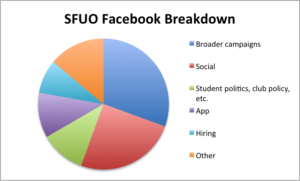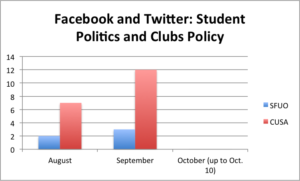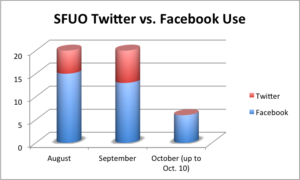Very few SFUO social posts involve student politics at the U of O
With the SFUO by-elections in full swing, the SFUO has posted exactly one time on Facebook about the by-elections, with no Twitter posts on the subject.
In contrast, the SFUO has posted four times about their recent Fight the Fees barbeque, and four times about their new app.
At the most recent General Assembly, and during last year’s elections for executive positions, several candidates mentioned using social media as a way to improve engagement in student politics, and how more needs to be done to make that happen.

The SFUO has 3,283 page likes on Facebook, and a whopping 4,015 followers on Twitter, which it uses even less than Facebook. If used effectively, these tools could really keep people involved in student politics.
However, with SFUO election numbers in the past few years falling below eight per cent, there needs to be a real focus on using social media to improve engagement in student politics.
But the real issue is this: Carleton’s student union is doing a much better job.

I know that after the Panda Game that’s probably not what you want to hear, but the silver lining is this—if the SFUO wants to improve, they have lots of tested ideas to draw on which are all very easy to implement.
The Carleton University Students’ Association (CUSA) has made a variety of student politics-oriented posts.

For example, in September CUSA posted links inviting students to attend CUSA council meetings and a Constitution and Policy Review Committee meeting, as well as a “meet your CUSA councillor” series. They also posted the key points of their new budget—and it got 33 likes.
These aren’t elections-related posts, but they’re still trying to get students involved in the political process. The SFUO has yet to post about its Board of Administration meetings, where the board decides SFUO policy every month, or the meetings of any specific SFUO committee open to the public.
The CUSA has also posted about a clubs workshop, general information session, and professional development conference in the month of September alone, not to mention registration information at the end of August.

To be clear, the SFUO has used Facebook effectively when it comes to campaigns and social events. They’ve done a good job, for example, of promoting their new app and Fight the Fees campaign, and deserve credit for that. Now, they just need to take that same strategy and apply it to student politics on Facebook, and more broadly increase its presence on Twitter.
And if nothing else, they can just copy the CUSA.





